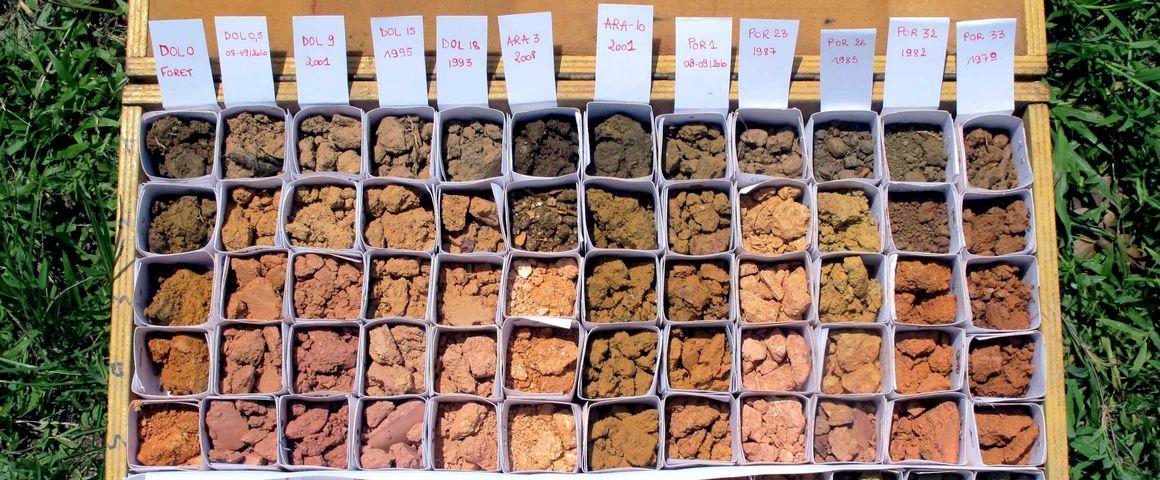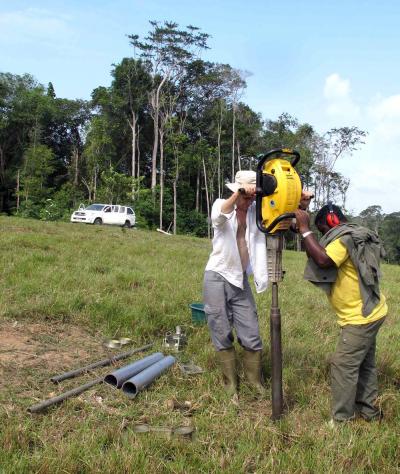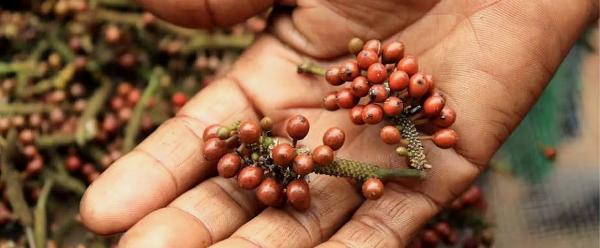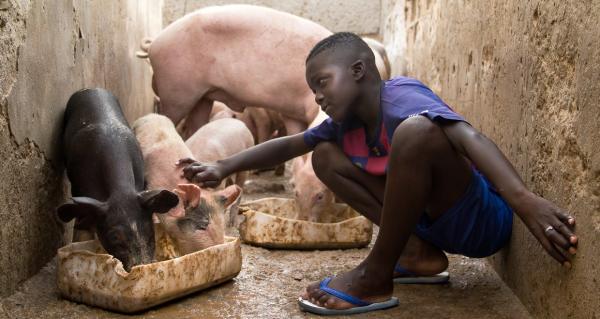Science at work 4 March 2024
- Home
- CIRAD news
- News
- 4 per 1000 in French overseas territories
4 per 1000: assessing soil carbon in the French overseas territories

Soil samples collected as part of the CARPAGG initiative (Carbon and greenhouse gases from grasslands in French Guiana) © V. Blanfort, CIRAD
Soil can be a massive carbon sink and thereby contribute to mitigating global warming. This low-tech solution is central to the 4 per 1000 initiative launched by France during COP21 in 2015. In 2019, a study evaluated the carbon storage potential of soils in metropolitan France. To supplement this research, an equivalent study for the French overseas territories, coordinated by CIRAD, began in late 2020 in seven territories: French Guiana, Martinique, Guadeloupe, Réunion, Mayotte, Saint-Barthélemy and Saint-Martin.
From biophysical data to agricultural practices
“The goal is to assess the state of knowledge on soil carbon in the French overseas territories”, explains Julien Demenois, coordinator of the study and 4 per 1000 project leader at CIRAD. “But it is also important to identify what we don’t know. These gaps will need to be filled, especially in order to design public policies that maintain soil carbon stocks, or to transpose the methods developed in the context of the Low-carbon label to the French overseas territories”.
The study is currently exploring the level of implementation of practices identified as conducive to soil carbon storage: inputs of organic matter, replacement of mineral fertilisers with organic fertilisers, reforestation of mining sites, introduction of temporary grasslands into vegetable crops, and crops in agroforestry. It is also examining the opportunities and constraints associated with these practices.
Overseas soils are rich in organic carbon…
Soils in the French overseas territories are tropical, with mostly volcanic soils in Réunion, Guadeloupe and Martinique, and iron oxide-rich soils in French Guiana. Because of their mineral properties, these specific soil types trap a lot of organic matter. They therefore store a large quantity of carbon: “Probably two to three times more per hectare than soils in metropolitan France”, says Julien Demenois. “French Guiana stores almost 15% of all carbon in French soils and 50% of all carbon in French forests, while the surface area of the territory is just over 10% of the total area of France, with 30% of its total forest cover”.
…but this is declining
However, current land-use and crop diversification trends indicate a decline in soil carbon stocks in the French overseas territories. The challenge for these territories is therefore to maintain their high stocks rather than to increase them, as is the goal in metropolitan France.
Filling the gaps
In an interim report (in french), the study highlights a significant knowledge gap covering around 4 500 km² and three of the seven territories of the study (Mayotte, Saint-Barthélemy and Saint-Martin). These are mainly forests for which no data is available. Julien Demenois expresses surprise that “there are still no studies on the impact of logging in French Guiana on soil carbon. Or that in Réunion, there has never been an assessment of carbon stocks in forest ecosystems”.
The researcher also deplores the lack of studies on agroforestry systems. “This is especially regrettable given that these systems are used in the overseas territories: the Creole gardens in the French West Indies or the slash-and-burn systems in French Guiana”.
Knowledge sharing between the overseas territories
One of the objectives of this study is to foster the sharing of knowledge, methodologies and assessment tools between the French overseas territories. “We have noted that a modelling tool for soil carbon dynamics, developed by INRAE for metropolitan France, could easily be used in Guadeloupe with a few minor adjustments”.
Extending the Low-carbon label to the overseas territories
The study examines the transposition of methods developed in the context of the Low-carbon label (see box) to the French overseas territories. The team has begun to identify the obstacles. For example, the modelling tool to be used in order to benefit from the Low-carbon label by assessing carbon stocks in arable soils in metropolitan France does not work at all for overseas soils. The main reasons for this are that the crops grown there and the soil and climate conditions are very different.
The Low-carbon label is the first climate certification tool adopted by France. It is awarded to projects or farms that reduce greenhouse gas emissions relative to a baseline. The assessment is based on a methodology and a framework approved by the French Ministry of Ecological Transition. However, at present, the French overseas territories have insufficient data to participate in this process.



























